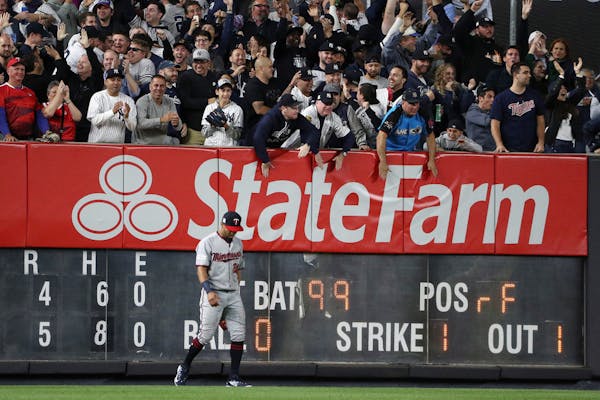Among the inglorious numbers associated with Minnesota sports history, some are more readily conjured than others. Just say 41-donut or 27-yard field goal, for instance, and Vikings fans will wince.
Perhaps because it has yet to stop growing, however, the number "16" doesn't quite register the same way. But make no mistake: the streak it represents is among the most amazing in Minnesota sports history.
From 2004 to present, the Twins have lost 16 consecutive postseason games: the last three in the 2004 Division Series; sweeps in 2006, 2009, 2010 and 2019; plus the wild-card game in 2017.
In what are often cited as the four longest-standing major men's professional leagues in the United States, the Twins are now tied for the longest playoff losing streak in history with the 1975-1990 Chicago Blackhawks of the NHL.
In a quest to quantify just how spectacular and unlikely this streak has been, I enlisted the help of Sean Forman — a person to whom many of us owe a debt of gratitude.
Forman is the creator of Baseball Reference, a site a lot of us visit as frequently as any other in the world. During a phone conversation this week — Forman is based in Philadelphia — we tried to boil heartbreak down into cold, hard calculations.
• Forman started out as basic as possible, essentially agreeing with the Chuck Klosterman assertion from his book, "Sex, Drugs, and Cocoa Puffs" that states "there is only one mathematical possibility: Everything is 50-50. Either something will happen, or something will not."
Can that be applied to a losing streak? It sure would make the calculation simpler.
"On the first cut is I would assume [the Twins] have a 50-50 shot of winning each game, just on average. They're a better-than-average team but they're playing other playoff teams. If we do that, then the probability of losing that many in a row is one half to the 16th power, which is microscopic."
Do that math … and yeah, that means the chances of the Twins losing 16 consecutive playoff games, when treating each as essentially a coin flip, are about 1 in 65,000.
• Ah, but there are extenuating circumstances.
Twins fans will be quick to point out that 13 of those 16 losses came to the Yankees (the other three were to the underdog Athletics). In every case, the Yankees had a better regular-season record (including 2010, when the division winning Twins had home-field advantage at 94-68 and the Yankees were one win better but came in as the wild card).
And in each of the five years the Twins and Yankees met in the postseason during this streak, the Yankees won the regular-season series — going a combined 23-8 against the poor Twins.
What if by some combination of the Twins having lesser records and the Yankees proving dominance during the regular season, the Twins only had, say, a 40% chance of winning on average in those 16 games.
Well, then the odds of the Twins losing all 16 is just … about 1 in 3,600. Yikes, still not good.
• However: The Twins actually scored first in 10 of the 13 playoff losses to the Yankees. Per Elias data, an MLB team that scores first generally wins about 66% of the time — two out of every three. That should at least flatten out the odds back to 50-50 if we take everything into account. So yeah, 1 in 65,000.
• Of course, most Twins fans probably would say the chance of the Twins winning a playoff game against the Yankees is 0%, making the streak hardly special at all. Forman would argue otherwise.
"I would just assume that they're extraordinarily unlucky," Forman said. "I don't put a whole lot of value into the thought of 'somebody wanted it more' or a team 'didn't know how to win.' A lot of it comes down to dumb luck.
"It can feel like a curse and retrospectively looks like a curse, but if any of those games go slightly differently, you and I aren't talking about it."





